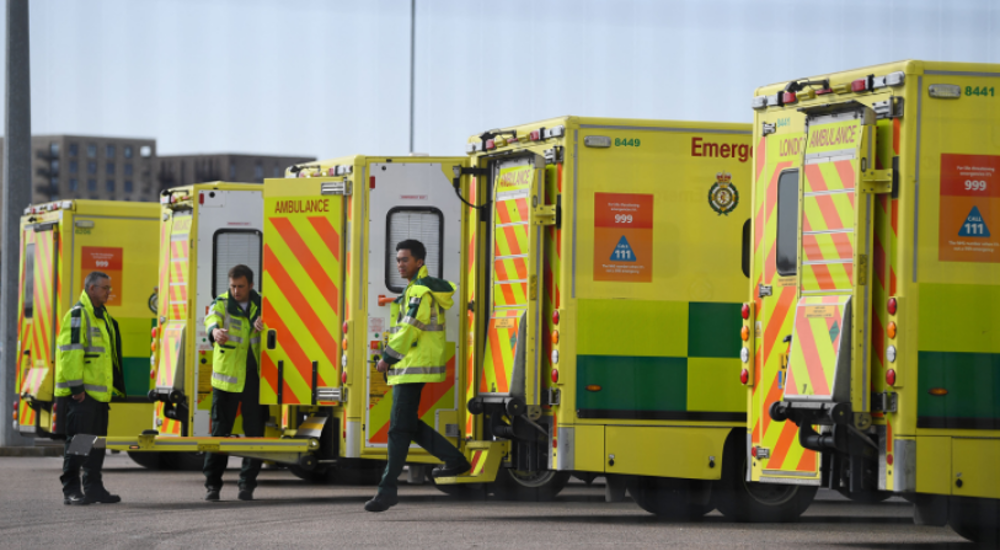
London Ambulance staff members are seen with vehicles in the car park at the ExCeL London exhibition center. (Photo by AFP)
London, November 28 (RHC)-- Britain's top accident and emergency doctor says about 4,000 patients a day are spending more than 12 hours in the emergency department because the care system has collapsed. The British National Health Service (NHS) publishes monthly statistics on the number of accident and emergency (A&E) patients forced to wait more than 12 hours after doctors chose to admit them to hospital.
According to the latest published data, last October, 43,792 patients waited more than 12 hours in the emergency department just for the doctor to decide on admission to the ward, totaling 50 percent more than last year.
“Urgent and emergency care services are facing considerable demand with record levels of attendances at major A&E departments last year, significant levels of COVID and the highest ever number of the most serious ambulance callouts this summer – that’s in addition to difficulties discharging thousands of patients who are medically fit for discharge,” an NHS spokesman said.
The system failure that is being said to cause about 2,000 deaths per month as the access to emergency room becomes harder. The Royal College of Emergency Medicine (RCEM) head Dr Adrian Boyle, issued a warning to the nurses who are planning their first national strike in history on December 15 and 20.
The nurses will protest before Christmas because of bad working conditions and wages due to rising prices and cost of living. According to Boyle, more than 7 million people are waiting for non-urgent, or elective, treatment. Nurses are generally mostly needed especially for the care of cancer patients, in helping them with their chemotherapy sessions, tests or transplant services. With the walk-out around 30,000 sessions and operations could be postponed.
In an interview with the Sunday Telegraph, Boyle pointed out the overcrowded condition of hospitals, the high number of wandering patients in the corridors of medical centers, and the amount of time it consumes to transfer patients from the ambulance to the emergency room.
Boyle touched on the arrival of winters and the spread of flu, warning against the escalation of the situation and signaling that the country's health system is on the verge of collapse. “We are very worried about what I would call British exceptionalism,” he told the Daily Telegraph. “There is avoidable mortality that is occurring pretty much only in Britain – which is related to the collapse of the emergency care system.”
Data gathered by the RCEM suggest the number of patients stuck on trolleys for more than 12 hours has risen by 50 percent in a year.
Sally Warren, director of policy at the King’s Fund think tank, said the health system is so stretched on all fronts that it is hard to arrest the deterioration in performance.
The British government has resorted to reducing public welfare expenses, including in the health sector, in order to reduce the budget deficit and organize the economic situation.
On November 21, the failed system reportedcly took the life of a five-year old Yusuf Mahmud Nazir whose family “begged and begged” for their nephew to be admitted to the hospital.
But the family was refused admission with the statement from Rotherham General Hospital “there are no beds and not enough doctors,” even though the doctor treating him described it as “the worst case of tonsillitis he had ever seen.” His family told Sky News the boy would still be alive had the hospital given him admission.

